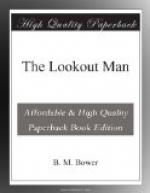“Well, I dunno what fur, but it stands to reason he’s on the dodge. All summer long he never showed up in Quincy when he was relieved. Stayed out in the hills—and that ain’t natural for a young city feller, is it? ‘N’ then he was ornery as sin. Got so’t I wouldn’t pack grub up to him no more. I couldn’t go ’im, the way he acted when a feller come around. ‘N’ then when they closed up the station, he made camp up there somewheres around Taylor Rock, and he ain’t never showed his nose in town. If I knowed what fur, I might ‘a’ did something about it. They’s a nigger in the woodpile somewheres, you take it from me.”
“Well, but that ain’t got anything to do with the girl,” the driver contested stubbornly. “I know her—she’s a mighty fine girl, too; and good-looking as they make ’em. I hauled their stuff up last summer—and them, too. They seem like nice enough folks, all of ’em. And I saw her pretty near every time I hauled tourists up to the lake.”
Hank chuckled to himself. “Well, I guess I know ’er, too, mebby a little better’n what you do. I ain’t saying anything ag’inst the girl. I say she was in the habit of meeting this feller—Johnny Carew’s the name he went by—meetin’ him out around different places. They knowed each other, that’s what I’m sayin’. And the way I figure, she’d went out to meet him, and either the two of ’em’s lost, er else they’re both storm-stayed up at his camp. She’s mebby home by this time. I look for ’er to be, myself.”
“You do, hey?” The driver twisted his head again to look back at Hank. “What yuh going up to help hunt her for, then?”
“Me, I’m just goin’ fur the ride,” Hank grinned.
They overtook Murphy, plodding along in the horse-trampled, deep snow, with a big, black hat pulled down to his ears, an empty gunny sack over his shoulders like a cape, a quart bottle sticking out of each coat pocket. They took him into the sleigh and went on, through another half mile of lane.
After that they began abruptly to climb through pine forest. In a little they crossed the railroad at the end of a cut through the mountain’s great toe. Dismal enough it looked under its heavy blanket of snow that lay smoothly over ties and rails, the telegraph wires sagging, white ropes of snow. Mrs. Singleton Corey glanced down the desolate length of it and shivered.
After that the four horses straightened their backs to steady, laborious climbing up a narrow road arched over with naked oak trees set amongst pines. Here, too, the deep snow was trampled with the passing of horses—the searching party, she knew without being told. The driver spoke to the two behind him, after a ten-minute silence against the heavy background of roaring overhead.
“Know that first turn, up ahead here? If we don’t have to shovel through, we’ll be lucky.”
From the back of the sleigh where he was sitting flat, Murphy spoke suddenly. “A-ah, an’ av ye don’t have to saw yer trail through a down tree, ye’ll be luckier sthill, I dunno. An’ it’s likely there ain’t a saw in the hull outfit!” He spat into the storm and added grimly, “An’ how ye’re to git the shled around a three-fut tree, I dunno.”




